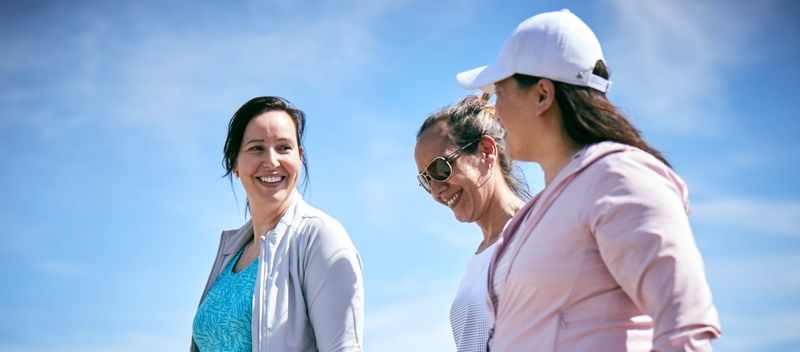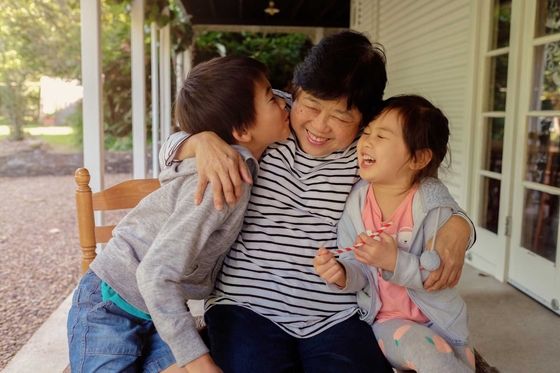
What do women want? Better heart health
Blog: 19 September 2022
Did you know that, globally, cardiovascular disease remains the leading cause of death in women? In Australia, cardiovascular disease affects women and men in similar numbers, but men continue to experience better heart health outcomes than women.
When people hear these statistics, the next question is often ‘why?’
In this blog, we explore five key reasons for the heart health gap between women and men and what we’re doing at the Heart Foundation to bring women’s heart health out of the shadows and into the light.
1. Supporting women to participate in heart disease research
Historically, women of childbearing age were excluded from heart disease research trials, meaning findings from research done mainly on men were applied to women. This is despite the fact women and men differ greatly when it comes to biology, behaviour and social norms.
It’s no surprise that the best way to understand how heart disease affects women is to conduct research involving (you guessed it) …women! While things have improved in recent years, barriers still exist to women participating in research. Ways to help break down these barriers include:
ensuring women know about heart disease research studies and how to get involved
making it easier for women to participate, recognising they often need to juggle multiple commitments including family, childcare, work and travel
addressing any concerns about getting involved, like possible medicine side effects
busting the myth that only very unwell people are eligible to participate in research.
If you’d like to know more about getting involved in research and current opportunities, visit the Australian Clinical Trials website. You’ll find over 600 heart health trials that are currently in need of participants! You could help researchers make new discoveries about everything from how different types of exercise affect blood vessels, to improving information given to people in hospital after a heart attack.
2. Raising awareness of women-specific risk factors and heart conditions that more commonly affect women
Earlier this year, Senator Kimberley Kitching sadly passed away from a heart attack at age 52. In the days and weeks after her death, lots of women reached out to us wanting to share their experience of heart disease.
We know that women are often surprised to learn that in addition to the ‘traditional’ heart disease risk factors like high cholesterol, high blood pressure, poor diet, and physical inactivity, there’s also women-specific risk factors. We want to make sure women, health professionals and researchers know about these risk factors, including:
premature menopause
pregnancy conditions – pre-eclampsia and gestational diabetes
polycystic ovary syndrome.
There are also heart conditions that affect women more commonly than men, like spontaneous coronary artery dissection. Also known as SCAD, this is a medical emergency that happens when a tear forms in one of the arteries supplying the heart with blood and oxygen. It most commonly affects women aged in their 40s and 50s. Symptoms are often similar to a heart attack. You can read more about SCAD on our website.
At the Heart Foundation, we want to make sure that women know about these types of conditions. And we want to make sure women-specific risk factors and conditions are part of health professional education and included in guidelines (like this new guideline on women-focused cardiac rehab). This will enable health professionals to support women at risk, or living with, heart disease.
3. Busting a popular pop culture myth – heart disease is a women’s disease too
You can probably think of several movies and TV shows depicting someone having a heart attack, sometimes known as a ‘Hollywood heart attack’. Chances are, it’s a man having a heart attack. And the pain comes on strongly and suddenly as they clutch at their chest and collapse to the ground. Sound familiar?
Well, we’re here to bust a myth. In Australia, equal numbers of women and men experience a heart attack every year. We want all women to be aware of the warning signs of a heart attack, and to not dismiss any unusual symptoms, especially as women and men can experience heart attacks in different ways.

If you are experiencing unusual symptoms and think you might be having a heart attack, don’t delay seeking help, call triple zero (000) right away. Read more about heart attack warning signs in women. To hear from real women who have experienced a heart attack, check out our heart stories.
4. Recognising that one size doesn’t fit all
When it comes to diagnosing and treating heart disease in women and men, we should be opting for the ‘tailor-made’ approach rather than one size fits all. For example, research has looked at how troponin levels differ in women and men experiencing a heart attack. Troponin is a protein that’s released into the blood stream when the heart muscle is damaged from a lack of blood and oxygen. It’s a test that can help doctors work out if a person is having a heart attack.
The researchers found that women tend to have lower troponin levels than men, meaning the levels might not reach the threshold needed to diagnose a heart attack. The result? Women may be told their hearts are fine, even when they’re not. The possible solution? Using a troponin test that is more sensitive and setting a troponin threshold that is specific to women! This means doctors may be able to more accurately identify women having a heart attack and treat them more quickly.
At the Heart Foundation, we fund ground-breaking research to understand more about women’s experience of heart disease. Associate Professor Lisa Moran is investigating ways to identify and support women with pregnancy conditions that can increase the risk of heart disease later in life, like pre-eclampsia and gestational diabetes. While Dr Cheryl Carcel, recently featured in our superhero blog, is exploring ways to close the gender gap.
5. Making sure all eligible women get a Heart Health Check
A woman’s risk of heart disease increases significantly around menopause. It’s thought that the falling levels of oestrogen play a role in increasing heart disease risk. A fall in oestrogen can lead to an increase in LDL (‘bad’) cholesterol and a decrease in HDL (‘good’) cholesterol levels. Blood vessels can also lose their elasticity and are more prone to a build-up of plaque.
51 is the average age of menopause, which is good timing given women (and men!) are eligible for an annual Heart Health Check with their GP from age 45 years. Aboriginal and/or Torres Strait Islander Peoples are eligible from age 30. However, women should see their GP earlier if they have a family history of heart disease or high cholesterol, or if they have any of the women-specific risk factors for heart disease.
A Heart Health Check is a 20-minute check-up with your GP to work out your risk of a heart attack or stroke in the next five years. As part of the Check, which is subsidised by Medicare, your GP will discuss what you can do to manage your risk, whether that’s getting more physical activity or following a heart-healthy eating pattern. Speaking of which, did you know that 85% of participants in Heart Foundation Walking are women? Whether you like to do it in a group, or fly solo with our Personal Walking Plans, we’ve got options to suit everyone. And if you need some inspiration for heart-healthy eating, check out our huge range of recipes.
According to the latest figures, over 300,000 people have had a Heart Health Check, and just as many women are getting a Heart Health Check as men, which is great news. But we want all eligible women in Australia to be booking in for one every year! What are you waiting for? Book in for a Heart Health Check with your GP today.
At the Heart Foundation, we remain committed to making the invisible visible when it comes to women’s heart health. In addition to empowering women with the information they need to look after their heart health, we’re also working to make sure women diagnosed with heart disease receive the best possible care. Find more information about women and heart disease on our website.
You might also be interested in...

Women's heart stories
Watch women from across Australia and some of their husbands and fathers tell us about their experience with heart disease.

Cardiovascular disease risk factors and heart attack warning signs in women
Information for healthcare professionals and the public on cardiovascular disease risk factors and warning signs affecting women.

Australia’s top women’s hiking event joins forces with the Australian Heart Foundation to save lives
Coastrek - Australia’s iconic hiking challenge – has launched its new charity partnership with Australian Heart Foundation to shine a light on women’s and First Nations People’s heart health.
Last updated22 August 2024
Last reviewed19 September 2022